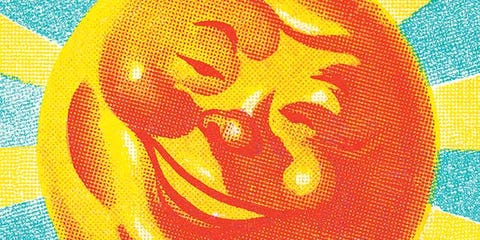Can Vitamin D Make You Gassy

CSA Images/Printstock Collection/getty images
Gassy or bloated? Have sharp abdominal pain and frequent problems in the, er, bathroom? A salmon fillet and a little sunshine may help cure your issues. A new study in BMJ Open Gastroenterology suggests that you may be experiencing these gastrointestinal woes because you're low in vitamin D—75% of all Americans are—and that increasing your intake could spell relief. ( The Power Nutrient Solution is the first-ever plan that tackles the root cause of virtually every major ailment and health condition; get your copy today!)
In the study, researchers found that a whopping 82% of participants with irritable bowel syndrome (IBS)—a disorder affecting the colon characterized by abdominal pain, constipation, diarrhea, and bloating—had insufficient vitamin D levels. The lower their levels, in fact, the more severe their symptoms and the worse their quality of life. (Here are 7 things your poop says about your health.)
Right now, it's too early to say if vitamin D deficiency causes IBS, or if people with some of these symptoms like frequent bloating—but not full-blown IBS—are also more likely to be low in vitamin D. But there is good reason to believe that increasing vitamin D levels will improve general bowel health, says study coauthor Bernard Corfe, PhD, as previous research shows that conditions like inflammatory bowel disease and colorectal cancer are also associated with low D levels.
One possible explanation for this nutrient's effect on your gut: There are vitamin D receptors located throughout the colon that help regulate bowel inflammation—and not getting enough vitamin D could interfere with that. Vitamin D also seems to play a role in the production of the mood-boosting neurotransmitter serotonin, which may be why people with IBS are also more likely to be depressed and rate quality of life as low.
MORE: 6 Weird Signs You're Not Getting Enough Iron
Currently, the Institute of Medicine recommends that adults get 600 IU of vitamin D every day, but it won't hurt to supplement with more—many doctors think that number is far too low and recommend anywhere from 1,500 to 4,000 IU (participants in the study were given 3,000 IU) for optimal health. If you want to see exactly where your levels lie, ask your doctor for a 25-hydroxy vitamin D blood test.
What you should do right now: "This study suggests that upping vitamin D intake via sun exposure, supplements, and food may help remedy certain symptoms for those with IBS and promote good general bowel health for the average person," says Corfe. So, while not a guarantee, the following diet and lifestyle changes may play a key role in getting you some much-needed relief. (Read more about the surprising reason you're short on vitamin D.)
1. Up your intake of vitamin D–rich foods.

cyoi/getty images
Think fatty fish like salmon, sardines, and tuna; eggs; liver; mushrooms; and fortified foods like yogurt, milk, almond milk, and cereals. These strategic dietary tweaks will get you closer to optimal vitamin D levels—a 3-oz fillet of salmon alone packs 447 IU—but diet alone may still not be enough if your levels are low. (Check out these 17 surprising ways to get more vitamin D via food.)
2. Consider a supplement.

china view/getty images
Because most people are low in vitamin D and medical experts agree that the recommended daily intake is on the low side, supplementing is smart—especially during winter months when you're not synthesizing your own vitamin D via sunshine. Look for vitamin D3 (cholecalciferol) and aim for at least 1,500 IU per day. (Here are the 10 worst things that can happen when you don't get enough vitamin D.)
3. Get some sun.
In warmer months, sunlight is your best source of vitamin D, and going outside for about 10 minutes in the midday sun in shorts and a T-shirt or tank top (without sunscreen—seriously, it's OK for this short amount of time) will allow you to produce about 10,000 IU—exceeding your daily quota. This isn't possible in the winter, because the sun doesn't get high enough in the sky for its UVB rays to penetrate the atmosphere, so stick to the two tips above.
Stephanie Eckelkamp Stephanie Eckelkamp is a freelance writer, health coach, and former associate editor for Prevention covering health, food, and nutrition.
This content is created and maintained by a third party, and imported onto this page to help users provide their email addresses. You may be able to find more information about this and similar content at piano.io
Source: https://www.prevention.com/health/a20498506/ibs-and-vitamin-deficiency/

0 komentar:
Posting Komentar